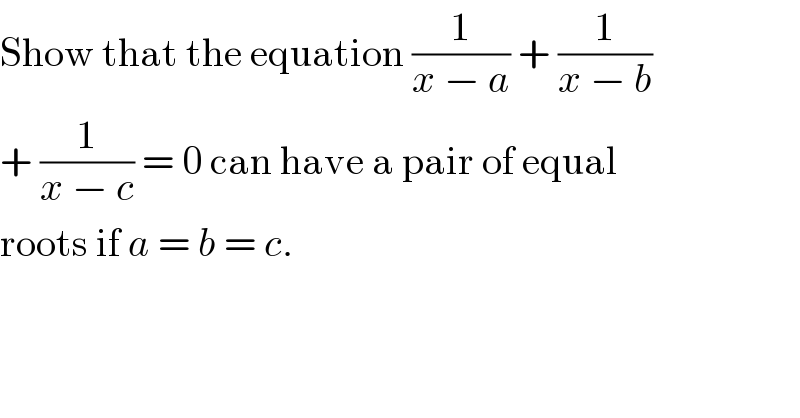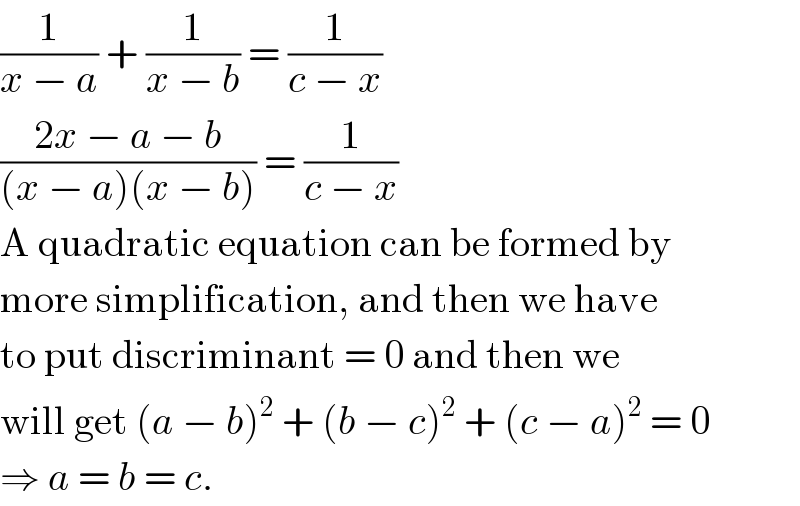
Question Number 20013 by Tinkutara last updated on 20/Aug/17

$$\mathrm{Show}\:\mathrm{that}\:\mathrm{the}\:\mathrm{equation}\:\frac{\mathrm{1}}{{x}\:−\:{a}}\:+\:\frac{\mathrm{1}}{{x}\:−\:{b}} \\ $$$$+\:\frac{\mathrm{1}}{{x}\:−\:{c}}\:=\:\mathrm{0}\:\mathrm{can}\:\mathrm{have}\:\mathrm{a}\:\mathrm{pair}\:\mathrm{of}\:\mathrm{equal} \\ $$$$\mathrm{roots}\:\mathrm{if}\:{a}\:=\:{b}\:=\:{c}. \\ $$
Commented by ajfour last updated on 20/Aug/17

$${how}\:{did}\:{u}\:{solve}\:{it}\:,\:{please}\:{let}\:{me} \\ $$$${know}. \\ $$
Commented by ajfour last updated on 20/Aug/17

$${if}\:{a}={b}={c}={k} \\ $$$${f}\left({x}\right)=\frac{\mathrm{3}}{{x}−{k}}\:\:{no}\:{roots}\:! \\ $$
Commented by ajfour last updated on 20/Aug/17

$${thanks}. \\ $$
Commented by Tinkutara last updated on 20/Aug/17

$$\frac{\mathrm{1}}{{x}\:−\:{a}}\:+\:\frac{\mathrm{1}}{{x}\:−\:{b}}\:=\:\frac{\mathrm{1}}{{c}\:−\:{x}} \\ $$$$\frac{\mathrm{2}{x}\:−\:{a}\:−\:{b}}{\left({x}\:−\:{a}\right)\left({x}\:−\:{b}\right)}\:=\:\frac{\mathrm{1}}{{c}\:−\:{x}} \\ $$$$\mathrm{A}\:\mathrm{quadratic}\:\mathrm{equation}\:\mathrm{can}\:\mathrm{be}\:\mathrm{formed}\:\mathrm{by} \\ $$$$\mathrm{more}\:\mathrm{simplification},\:\mathrm{and}\:\mathrm{then}\:\mathrm{we}\:\mathrm{have} \\ $$$$\mathrm{to}\:\mathrm{put}\:\mathrm{discriminant}\:=\:\mathrm{0}\:\mathrm{and}\:\mathrm{then}\:\mathrm{we} \\ $$$$\mathrm{will}\:\mathrm{get}\:\left({a}\:−\:{b}\right)^{\mathrm{2}} \:+\:\left({b}\:−\:{c}\right)^{\mathrm{2}} \:+\:\left({c}\:−\:{a}\right)^{\mathrm{2}} \:=\:\mathrm{0} \\ $$$$\Rightarrow\:{a}\:=\:{b}\:=\:{c}. \\ $$
